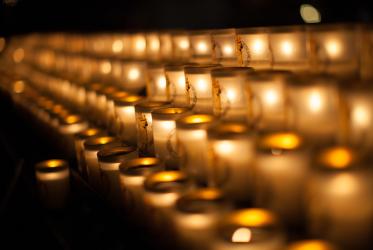Rejoice in Hope
by Kosuke Koyama
"Rejoice in Hope." How strange this sounds! How are we to "eat" this message (Jer. 15:16)? We live in a world so shattered and broken by violence. The "whole inhabited world" (oikoumene) is full of the desperately poor, starving children, people uprooted from their homes, and innocent victims of war and ethnic conflict. The threat of nuclear extinction still hangs like a cloud on our horizon and our planet is in the grip of an ecological crisis. How can we rejoice in hope?
Our everyday perception of joy and hope fails to comprehend the mystery which surrounds this message of hope in which we can rejoice. The mystery is of a compassionate God who embraces the world. The more desperate the world becomes, the more intimate and determined becomes the life-sustaining embrace of God. This is our faith. This is where we stand. "Rejoice in hope" rings out "throughout the land to all its inhabitants" from the compassionate God (see Lev. 25:10). We hear God's word: "Remove the sandals from your feet, for the place on which you are standing is holy ground" (Ex. 3:5). The whole world is now holy ground. We remove our sandals. Grace is barefoot.
Our thoughts turn to Jesus Christ, who himself was homeless. "...The Son of Man has nowhere to lay his head" (Luke 9:58, 2:7). God's embrace of the world has become passionate in this homeless Son of Man. No one is more homeless than the crucified Jesus. Jesus -- crucified -- barefoot -- the shattered, broken Christ - speaks to the shattered, broken world. The cross is the most holy ground before which the very sandals of God are removed. "O sometimes it causes me to tremble, tremble, tremble. Were you there when they crucified my Lord?" In this evangelical space "we may be knocked down but we are never knocked out!" (2 Cor. 4:9, J.B. Phillips). This space is nurtured and maintained by the Spirit of God whose name is Compassion. This is the space in which the eighth assembly of the WCC, by the grace of God, finds itself.
The call to "rejoice in hope" begins with the "impassioned God" (Ex. 20:5, Jewish Bible). There is a painful relationship between the world and this God who embraces it. Through the ancient prophet Hosea, God says: "My mind is turning over inside me. My emotions are agitated all together" (11:8, Anchor Bible). Israel is found to be unfaithful. But God refuses to give her up. The world is unfaithful. But God refuses to give it up. God is caught in a dilemma. God is in distress, a distress sharpened by love. The mystery of our theme, "rejoice in hope", is hidden in this extraordinary story of God's inner life.
Is hope related to the future? Yes. But even more it is related to love. Hope is not a time-story. It is a love-story. "We shall overcome someday" means "we shall overcome by the power of compassion". The gospel dares to place love above time. All the healing stories of the gospels, and ultimately the confession of the faith that "the third day he rose again from the dead" (the Apostles' Creed) point to this awesome truth. Hope is impassioned by love as is every healing word of Jesus. "Stand up, take your mat and go to your home" (Mark 2:11). Remember! The one who says this is homeless, and he embodies fully the God who embraces the world. How impassioned the whole situation is! If God is found in sheol ("cold storage") as the Psalmist says, then, sheol will melt in the heat of the compassionate God (139:8). Was not the Birmingham City Jail made hot by the impassioned hope of Rev. Martin Luther King Jr when he was imprisoned there? What is hope if it is not inspired by love? What is the field of love if it is not the whole inhabited world? Hope is a hot love story.
Is hope about that which is not seen? Yes. "Hope that is seen is not hope. For who hopes for what is seen?" (Rom. 8:24). "Although you have not seen him, you love him..." (1 Pet. 1:8). But hope is rooted in "what we have heard, what we have seen with our eyes, what we have looked at and touched with our hands" (1 John 1:1). What is love if it remains invisible and intangible? "Those who do not love a brother or sister whom they have seen, cannot love God whom they have not seen" (1 John 4:20). The devastating poverty in which millions of children live is visible. Racism is visible. Machine guns are visible. Slums are visible. Starved bodies are visible. The gap between the rich and the poor is glaringly visible. Our response to these realities must be visible. Grace cannot function in a world of invisibility.
Yet, in our world the rulers try to make invisible "the alien, the orphan, and the widow" (Jer. 7:6; see Ex. 22:22, Ps. 82:3, Mark 12:40, James 1:27), and the "hungry, thirsty, stranger, naked, sick and imprisoned" (Matt. 25:31-46). This is violence. The gospel insists on visibility -- the emaciated bodies of starved children must remain visible to the world. There is a connection between invisibility and violence. People, because of the dignity of the image of God they embody, must remain seen. Faith, hope and love are not vital except in "what is seen". The ecumenical movement seeks the visible unity of the churches. Was not God visible in Jesus Christ (John 1:18, 14:9)? The gospel sees the mystery of salvation in what is seen. Religions seem to raise up the invisible and despise what is visible. But it is the "hear, see, touch" gospel that can nurture the hope which is free from deception.
The one God embraces the one world which speaks more than 7000 dialects and languages. God is open to all cultures and nations. "Blessed be Egypt my people, and Assyria the work of my hands, and Israel my heritage" (Isa. 19:25). How many languages does God speak? All of them! No people can speak an isolated language, and have an exclusive self-identity. All peoples are webbed. The church is in the world and the world is in the church. God's word to the church is God's word to the world. There are no "two words" of God, one for the church and another for the world. The one world listens to Christ's words to "the goats" and to "the sheep" (Matt. 25:31-46). In the hearing of the one world Jesus exclaimed: "I watched Satan fall from heaven like a flash of lightning" (Luke 10:18). When God embraces this one world with compassion, the world becomes "upside down" (Acts 17:6). What a commotion!
Listen to Jesus' commotion-filled parable: "But while he was still far off, his father saw him and was filled with compassion; he ran and put his arms around him and kissed him" (Luke 15:20). A running God! What can we make of the Centre God who runs out to the periphery? While we are puzzled, the periphery becomes the centre! The light shines from the periphery, not from the centre. From "the stone that the builders rejected" comes salvation (Mark 12:10). What an unexpected commotion! "Quickly, bring out a robe -- the best one -- and put it on him; put a ring on his finger and sandals on his feet... And get the fatted calf...". Grace causes commotion, not tranquillity. The church is the body of Christ who runs to welcome the broken world. Our hope, by nature, is not tranquil, it is commotion-ful. The apostolic "rejoice in hope" is known in this world turned "upside down" by the running God.
It is the task of theology to paint this grace-impelled commotion -- to make it visible. Ministry is to "bring out a robe, quickly". The commotion-event ushered in by the coming of Jesus Christ is the gospel. The commotion is not pain-free. The followers of Christ can have different views and convictions about some of the issues that confront us today, even while they participate together in sincere Bible study and devoted worship. With sincerity and devotion we are called to place our views and convictions under the light of the compassionate God who embraces the world. In theology and in ministry, we must become "barefoot" and "homeless".
"Rejoice in hope" says the homeless apostle (Rom. 12:12, 1 Cor. 4:11). He continues: "extend hospitality to strangers" (Rom. 12:13). He is in line with the ecumenism of Jeremiah: "Seek the welfare of the city... for in its welfare you will find your welfare" (29:7). The gospel of the Compassionate Spirit admonishes us to rejoice with the strangers, with the world. The world is not just "goats". "See, I am sending you out like sheep into the midst of wolves" -- this is not an absolute, fixed truth (Matt. 10:16). The Spirit of God embraces the world of the "goats and sheep". "The time is fulfilled, and the kingdom of God has come near" (Mark 1:15). To rephrase John's gospel: "God came to what was God's own, and God's own received God joyously!" (see 1:11). This is the substance of our rejoicing in hope. The rejoicing of a private and exclusive community fails to invite all to hope. That is not the gospel. Hope with all creation, and rejoice with all creation! What a far-reaching horizon (Ps. 139:7-10)!
This horizon is not a hallucination. For God no one is a stranger. Every person -- whatever his or her cultural, religious, racial, political identity -- is known to God as an irreplaceable and incomparable person. This is the root of God's wholesome ecumenism. But when our actions say "I am not my brother's keeper" (Gen. 4:9) -- the clearest most understandable expression of sin -- we treat God as a stranger. To say "I am not my brother's keeper" is to look upon others as pollution. This destroys the foundation for hope for the world. "Rejoice in hope" is to "love your neighbour as yourself". If hope is not experienced now, it may not be experienced in the future.
We cannot love our neighbours unless we are open to being loved by our neighbours. We cannot extend hospitality to strangers unless we accept hospitality from strangers. The gospel upholds this two-way traffic. One-way traffic breeds self-righteousness. "...a woman came with an alabaster jar of very costly ointment of nard, and she broke open the jar and poured the ointment on his head". Deeply impressed by this hospitality -- even as it causes a considerable commotion among onlookers -- Jesus accepts and commends her. "Truly I tell you, wherever the good news is proclaimed in the whole world, what she has done will be told in remembrance of her" (see Mark 14:3-10).
"Rejoice in hope" is an "upside-down" possibility. It lives today in the commotion caused by grace. The biblical mystery is not tranquil. It is impassioned. It is about the homeless Jesus who embraces everyone by going to the periphery. Therefore, cantate domino, for "the light shines in the darkness and the darkness has not overcome it" (John 1:5).


